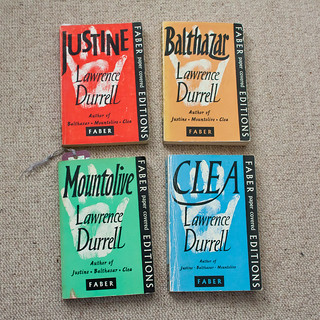Each man has his own interpretation
The Alexandria Quartet
Book 3: Mountolive
by Lawrence Durrell
Well, I had an inclination that book three would get political and I was certainly proved right, but it also had some other big differences from the two books that precede it. I can’t decide whether I was thrown by this or drawn deeper in than ever.
Where the first two books are narrated by an initially un-named first person and set entirely in Alexandria over an approximately two-year time period (plus the occasional jump forward to the time of writing, which seems to be only shortly later), Mountolive is a more traditional third-person narrative, following the titular David Mountolive from his youthful first visit to Egypt, through his illustrious (and well travelled) career with the British Diplomatic Service until he is finally posted back to Egypt as British Ambassador, the position in which he had occasionally popped up in Balthazar.
This takes up the first 100 pages or so, about a third of the novel, but it is essential background to understanding the man and his actions. Despite his limited appearances previously, Mountolive is key to the story we have already heard twice. In true Durrell style we learn of goings-on that were hinted at but never revealed in Justine or Balthazar and all the old characters are intricately tied up in machinations that are at times surprising, at times make complete sense of what before had been blurry.
In some ways this reads like a detective novel, with Mountolive the stoic investigator, a career man who was once passionate and romantic even, but is now middle aged and enjoying the power and status of his new job. The suspect is Nessim, the rich banker who has always seemed suspect and shadowy but now we learn what he is suspected of. And it is of course different things by different people. Indeed, is he even really deserving of suspicion or is he merely a puppet for some other player? Perhaps his wife, the beautiful and seductive Justine. Or his brother, the disfigured and hard-working Narouz. Or his mother, the strong and proud Leila.
Limiting the story (for the most part) to these two men, and switching to the third person, makes this in some ways a more straightforward read than the previous two books. Which is helpful when you are called upon to understand some complex political manoeuvrings. But there are moments when the narrative directly contradicts something previously learned and it becomes blurry again; which version is to be believed? Is this narration actually omniscient or is this narrator better at hiding?
Balthazar at one point says, “Truth naked and unashamed. That’s a splendid phrase. But we always see her as she seems, never as she is. Each man has his own interpretation.”
The language is evocative as ever – “The desert was like a dry kiss, a flutter of eyelashes against the mind” – and even the psychological exploration has not disappeared, such as in this exchange:
“If only we did not have to keep acting a part, Justine.”
“Ah, Nessim! Then I should not know who I was.”
So, will Clea wrap everything up nicely or throw it all back into confusion? I can’t wait to find out.
First published 1958 by Faber and Faber.
See also: my reviews of
Book 1: Justine
Book 2: Balthazar
Book 4: Clea

Wonderful quotes. Makes me want to grab my copy and start reading right away.